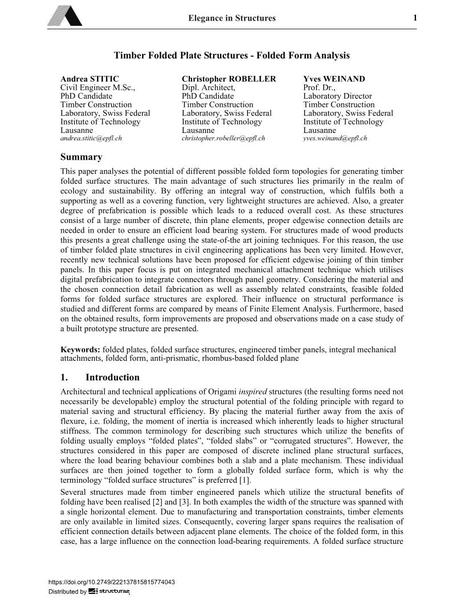Timber Folded Plate Structures - Folded Form Analysis

|
|
|||||||||||
Bibliografische Angaben
| Autor(en): |
Andrea Stitic
Christopher Robeller Yves Weinand |
||||
|---|---|---|---|---|---|
| Medium: | Tagungsbeitrag | ||||
| Sprache(n): | Englisch | ||||
| Tagung: | IABSE Conference: Elegance in structures, Nara, Japan, 13-15 May 2015 | ||||
| Veröffentlicht in: | IABSE Conference Nara 2015 | ||||
|
|||||
| Seite(n): | 76-77 | ||||
| Anzahl der Seiten (im PDF): | 8 | ||||
| Jahr: | 2015 | ||||
| DOI: | 10.2749/222137815815774043 | ||||
| Abstrakt: |
This paper analyses the potential of different possible folded form topologies for generating timber folded surface structures. The main advantage of such structures lies primarily in the realm of ecology and sustainability. By offering an integral way of construction, which fulfils both a supporting as well as a covering function, very lightweight structures are achieved. Also, a greater degree of prefabrication is possible which leads to a reduced overall cost. As these structures consist of a large number of discrete, thin plane elements, proper edgewise connection details are needed in order to ensure an efficient load bearing system. For structures made of wood products this presents a great challenge using the state-of-the art joining techniques. For this reason, the use of timber folded plate structures in civil engineering applications has been very limited. However, recently new technical solutions have been proposed for efficient edgewise joining of thin timber panels. In this paper focus is put on integrated mechanical attachment technique which utilises digital prefabrication to integrate connectors through panel geometry. Considering the material and the chosen connection detail fabrication as well as assembly related constraints, feasible folded forms for folded surface structures are explored. Their influence on structural performance is studied and different forms are compared by means of Finite Element Analysis. Furthermore, based on the obtained results, form improvements are proposed and observations made on a case study of a built prototype structure are presented. |
||||

